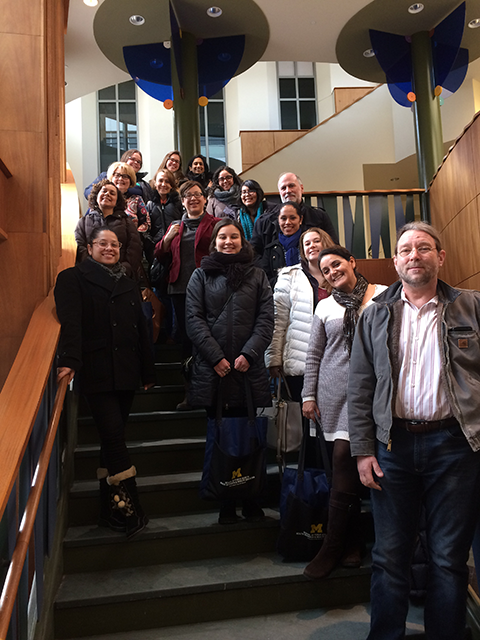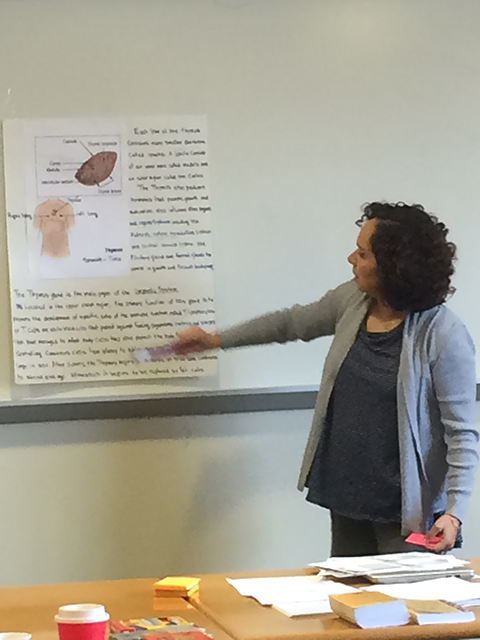Promoting linguistically and culturally competent language services in community settings has been a dream of mine for many years. This dream was forged thorough years of work as a Spanish medical interpreter at the University of Michigan Health System, and as a community advocate for the Spanish-speaking immigrant community in Washtenaw County. These experiences inspired me to pursue a doctoral degree at the School of Public Health. Although working toward this degree has been a privilege, it does have its downsides. I found that following my dream was replaced by heavy coursework, research projects, and academic manuscripts. During my participation in the 2016 Rackham Institute for Social Change, I was able to reawaken my passion for community activism and connect it with my newly developed research skills. Moreover, my participation in the Institute for Social Change led me to apply to the Rackham Public Scholarship Grants, which supported the planning, development, and implementation of the Spanish Community Interpreter Project (SCIP).
Engaging in community-based participatory research has helped me realize that publicly engaged scholarship and practice takes many shapes and requires many actors-and hours of work! That has certainly been the case with the SCIP, which focuses on promoting language access and community capacity building to improve health outcomes among vulnerable immigrant populations. In planning and developing the SCIP, many steps were taken under the guidance of a steering committee. This committee is primarily composed of active members of the community who, with their perennial commitment to improving the well-being of their fellow Latinos, contributed their experiences. Their guidance in navigating the U.S. health system, helping children succeed in school, and advocating for immigrant rights in Washtenaw County has been extremely valuable in designing the SCIP training curriculum. In addition, the interest expressed by non-profit community-based organizations in the program, and their willingness to collaborate in its implementation has been overwhelming. Their commitment to continually improving their outreach and services to those who need them most has fueled this project.

Community members from more than ten community-based organizations attending the Spanish Community Interpreter Training.
Leading this project has been among the most valuable professional and personal experiences I have ever had. Because of my participation, I have expanded my implementation and process intervention, utilization-focused evaluation and dissemination capacities, and fostered the creation of partnerships for collaborative research. Finally, learning about my fellow community members’ day-to-day experience with adapting to their new lives in the U.S., and witnessing their resilience and never-ending optimism, has been an extremely rewarding and humbling experience. It has been a source of inspiration and strength, and a powerful and motivating force that fuels my dissertation research work.

Adriana Ochoa, one of the 20 SCIT Trainees, presenting a review of medical terms related to the urinary system’s anatomy, physiology, and medical procedures to classmates.
Because of them and for them, 20 bilingual community members are currently attending the Spanish Community Interpreter Training (SCIT). These community members come from more than ten community-based organizations that are interested in, or already working with, the rapidly growing Spanish-speaking immigrant community in Washtenaw County. SCIT trainees will promote language access by providing accurate and competent interpreting services in healthcare, mental health, social service, public school, and immigration law. I look forward to working with them to mobilize their experience and commitment for the benefit of the community we share.
The Rackham Program in Public Scholarship (RPPS) supports collaborative scholarly and creative endeavors that engage communities and co-create public goods while enhancing graduate students’ professional development. We support graduate students looking to deepen their public engagement through four core offerings: The Institute for Social Change, Engaged Pedagogy Initiative, Grants in Public Scholarship, and Rackham Public Engagement Fellowships in sites across Southeast Michigan – all to support research, teaching, and projects that reach public audiences and foster impact beyond the classroom.

